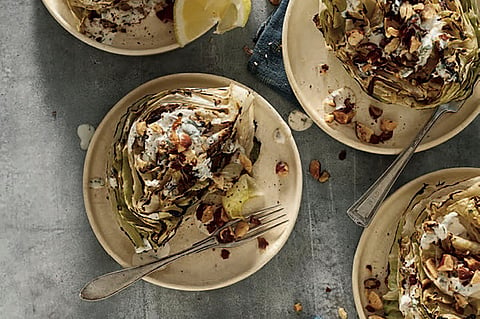
- LIFESTYLE
- FASHION
- FOOD
- ENTERTAINMENT
- EVENTS
- CULTURE
- VIDEOS
- WEB STORIES
- GALLERIES
- GADGETS
- CAR & BIKE
- SOCIETY
- TRAVEL
- NORTH EAST
- INDULGE CONNECT

The way live fire brings people together. The universal embrace of smoky flavours. The theatrical nature of what could otherwise just be a family getting food on the table.
“If you simmer a pot of soup on the stove, nobody’s going to gather around and watch the show,” said Raichlen, author of “The Barbecue Bible” and 32 other books.
He wasn’t searching for grilled vegetables. He found them everywhere anyway.
Grilled mushrooms, peppers and even artichokes in Italy. Planks of asparagus laced onto wire-thin skewers in Japan. Corn and chilies served in countless ways in Latin America.
Much of what he found ended up in “ How to Grill Vegetables,” which also is a nod to his wife, daughter and cousin, all vegetarians. “So it’s sort of self-defense.”
But he notes that nearly all his books devote a substantial section to vegetables.
“There’s nothing like the high, dry heat of the grill that intensifies a vegetable’s sweetness,” he said. “In so many cultures, grilled vegetables really have a very important place.”
The first thing to consider is the structure of the vegetable, Raichlen said, and then select the appropriate method.
As a general rule, high-moisture vegetables like zucchini, peppers and mushrooms are best served by direct grilling, meaning cooking over a high-heat fire with the lid open. He recommended bringing the temperature to 500 F to 600 F.
Denser vegetables like turnips, cauliflower or leeks are better served by indirect grilling, or cooking next to the fire, with the lid closed, at 350 F to 400 F.
Closing the lid presents another opportunity to inject the vegetables with smoky flavor by adding wood chips or chunks to the fire or smoker vault of a gas grill, he said.
“Then you can smoke as well as roast, so you wind up with very incredible flavours,” he said.
Many cultures char certain vegetables directly on hot coals, which Raichlen calls “caveman grilling.”
Baba ganoush, the Middle East’s smoky eggplant dip, is the best-known example.
“It’s an absolutely magical dish, because the eggplant has a smoking device built right into it,” he said, referring to its thick skin. “All you do is char the skin and it permeates the flesh.”
Tomatoes, onions, squash and zucchini work, too. Just fan the embers with newspaper to blow away excess ash. Sear the vegetables on all sides, turning frequently, and scrape away the most-burnt parts.
Beyond corn, peppers and other usual suspects, Raichlen also has grilling recipes for potatoes, beets, carrots, avocados and even lettuce.
He makes a grilled version of the steakhouse classic wedge salad with a quick homemade dressing spiked with chipotle peppers. Simply cut a head of iceberg lettuce into quarters and briefly sear the cut sides. The edges get sweeter and pick up smoky notes while the center stays cool and crisp.
Before grilling, it’s best to scrub the grill grate and coat it with vegetable oil — good advice for all types of grilling. And it’s usually a good idea to first season vegetables with an olive oil-based marinade.
Then it’s a matter of “doing a dance on a razor’s edge” between pleasantly charred and outright burnt, Raichlen said. “You try and get as close to burnt as possible without actually burning.”
Two recipes from Raichlen's “How to Grill Vegetables”:
Serves: 4 to 6, about 2 cups
Time: 10 minutes to prep, 6 to 10 on the grill
2 small or 1 medium eggplant, about 1 pound
2 large plum (Roma) tomatoes
1 sweet onion (unpeeled)
1 large clove garlic, peeled, loosely wrapped in aluminum foil
1⁄2 teaspoon freshly and finely grated lemon zest
2 tablespoons lemon juice
3 tablespoons extra virgin olive oil
2 tablespoons chopped dill or parsley
Set up your grill for ember, or “caveman” grilling. Rake out the coals in an even layer and fan off loose ash. (Alternatively, this recipe can be made with high-heat, direct grilling.)
Lay the vegetables on the coals and grill, turning often with tongs, until the skins are charred and flesh is easily pierced with a skewer, about 2 minutes for the garlic, 4 minutes for the tomatoes, and 6 to 10 minutes for the eggplants and onions.
Transfer the veggies to a wire rack set over a rimmed sheet pan to cool. Scrape and discard the really burnt parts. Roughly chop the vegetables.
Place them in a food processor and pulse to a coarse puree. Work in the zest and juice and enough extra-virgin olive oil to obtain a loose puree. Add the dill, season to taste with coarse salt and black pepper. Serve with pita bread or chips.
Serves 4
Time: 15 minutes to prep, 3 to 4 minutes on the grill
1⁄3 cup mayonnaise
1⁄3 cup buttermilk
1 tablespoon rice vinegar
1 teaspoon minced canned chipotles in adobo
1⁄2 teaspoon lime zest
1 tablespoon lime juice
3 tablespoons chopped cilantro or dill
1 head iceberg lettuce, cut into quarters through the core
1⁄4 cup chopped smoked almonds
In a small bowl, whisk the mayonnaise, buttermilk, vinegar, chipotle, and lime zest and juice. Salt and pepper to taste. Wait to stir in the cilantro until just before serving.
Set up your grill for high-heat, direct grilling. Scrape the grill grate clean and coat with vegetable oil.
Brush the cut sides with olive oil. Arrange the wedges cut sides down on the grill on a diagonal. Grill until lightly singed, 1 to 2 minutes, giving each wedge a quarter turn after 30 to 60 seconds to lay on a crosshatch of grill marks. Grill the other cut side, working quickly so the lettuce remains raw in the center.
Transfer the wedges to a platter, spoon over the dressing and sprinkle with almonds.